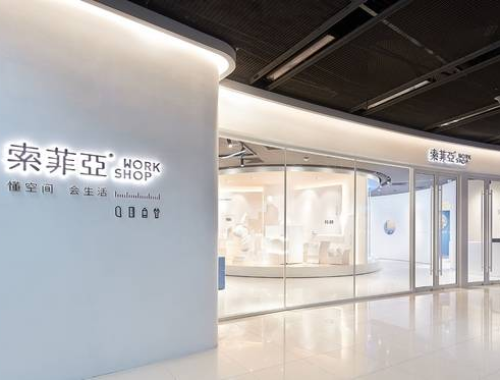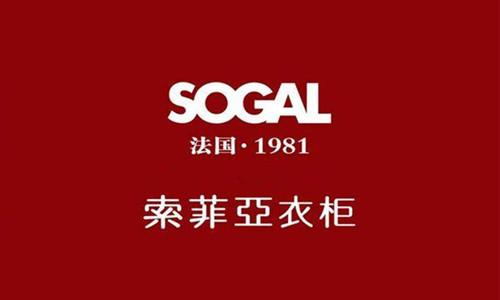Wang Bing, Executive President of Sogal---Secret of Sogal's Digital Road
Source:77°
With the in-depth application of big data, Internet of Things, and smart manufacturing, digitalization is the inevitable way for enterprises.
Recently, HUNDUN ACADEMY and Mr. Wang Bing, the current CEO of Sogal, held a theme sharing session on the 40-year development history of the brand.
Prior to Sogal, Mr. Wang Bing worked in Fortune 500 companies such as Accenture and Hewlett-Packard, mainly engaged in digital consulting in the consumer goods industry. It can be said that the joining of Mr. Wang Bing complements Sogal's digital development strategy.
In the development process of Sogal, the digital strategy is a key step. As Mr. Wang Bing said, with the expansion of enterprise scale and customer base, with the in-depth application of big data, Internet of Things and intelligent manufacturing, digitalization is an inevitable road for enterprises.
Before starting digital sharing, Mr. Wang Bing first introduced the characteristics of the customization industry, and these characteristics just proved the correctness of Sogal's early development strategy of digitalization.
Regarding the characteristics of the customization industry, Mr. Wang Bing said, first of all, because the C-end customer group facing customized furniture is highly personalized in terms of design, style, function, material and color, based on the above characteristics, the customization industry proposes to the factory manufacturing side in order to meet the requirements of a high degree of flexibility.
Secondly, furniture belongs to the field of large consumer goods, with a long business chain, many and different roles, and the cycle from consumer selection to brand delivery is relatively long. The customization industry is essentially an industry integrating retail, service, and manufacturing, but it is also an asset-heavy industry. Therefore, customized companies have to face both the pressure of the retail industry and the huge pressure of product delivery. In summary, digital transformation is an indispensable step for customized enterprises.
In this event, Mr. Wang Bing mainly shared three aspects: how companies can improve efficiency, how companies can improve customer acquisition capabilities, and the elements and cycles of the furniture industry itself.
One of the digital troika---Enhancing efficiency engine
The customization industry is currently at a relatively young stage, and it has only been about 20 years since Sogal introduced the concept of customized wardrobes to China. Before 2010, most of the customization industry was small and medium-sized enterprises, but since Sogal established the concept of customized wardrobe in 2001, more and more players have participated in it.
From 2010 to 2017, it is a bonus period for the growth of the customization industry. The rapid development of the market has led to a blowout development in demand, but various related problems have also followed. The core bottleneck is that the factory's supply capacity cannot meet the growth of market demand.
Different from finished furniture, customized furniture is a total solution based on individual choice. Because designers have different understandings of personalization, when the order is delivered to the factory, the manufacturing side cannot obtain the order information clearly and accurately, so the quality of the product cannot be guaranteed. At the same time, the factory has a long cycle in order splitting, organization, delivery, and transportation. If things go on like this, as the number of orders increases, product damage and internal consumption will also increase.
Based on the above phenomenon, the only way for customized enterprises to improve the operational efficiency of the headquarters is to carry out digital reforms. When the scale of the enterprise has not developed to a certain size, the above problems will not be highlighted, and the enterprise can overcome it through more rigorous and refined management. But Sogal, as a pioneer of domestic custom cabinets and a leading company in the industry, will naturally face these problems. Therefore, Sogal at that time promoted digital construction in an all-round way from a strategic rather than a tactical level.
From 2001 to 2011, Sogal listed the company through explosive funds. After the listing, Sogal had to face expectations from shareholders and more stringent tests in the market. In the past, a single product architecture would inevitably not be able to help Sogal achieve the goal of tens of billions of dollars. The company needs to expand in categories to have more room for imagination, but this puts higher requirements on the level of flexible manufacturing in the factory.
In addition, with the growth of Sogal, its business scale, number of factories, and dealer team have continued to grow. In the complex and lengthy industrial chain, Sogal needs to ensure the efficiency of manufacturing, the fast and high-quality delivery of products, and the high-quality service level of distributors. All of the above are difficult to achieve by relying solely on manual labor. Only by relying on a high degree of digital technology and applications can the many required links be carried out efficiently and smoothly. For this reason, the 1.1 billion raised by Sogal after its listing in 2011 were all invested in digitalization, informatization and industrialization.
Mr. Wang Bing emphasized that in terms of digitalization strategy, Sophia mainly revolves around the industrialization of factories, the rapid expansion of the nationwide dealer network, and the expansion of the store-to-factory data link.
In order to realize its own strategy, Sogal has taken a series of actions in terms of digitalization. The first is to create an IDC Information & Digital Centre (Information & Digital Centre).
In 2014, when Mr. Wang Bing joined Sogal, he started to form the company's IDC. Up to now, Sogal’s IDC has a strong organization and can operate efficiently. Mr. Wang Bing emphasized that IDC is the engine of the company's progress and can drive the development of the company's business.
For IDC, Mr. Wang Bing emphatically talked about three points. The first is the positioning of IDC employees. Every IDC member in Sogal is a driver of the company's business, and their behavior is directly linked to the company's business. Companies can evaluate employees through KPIs, and employees also need to be responsible for their own business results.
Then, it is the overall layout of IDC, which varies depending on the company's situation and operating mode, but it can be roughly divided into several major sections. The first is the marketing section. Through IDC's technical support, it promotes the rapid development of marketing, enhances interaction with consumers, supports the development of online and offline business activities, and strengthens the collaboration between employees and information. The second is operation and maintenance, the company's three to five years planning, and how to manage projects, clarify budgets, strengthen output and reduce risks.
In addition to building an IDC team, Sogal also acquired a domestic five-star hotel decoration design company-Jidian Sanwei. Mr. Wang Bing said that the customization industry focuses on design and individualization, and users prefer one-stop design services and overall design solutions. But how to make the design plan to be delivered quickly is the biggest bottleneck in the industry. Sogal is positioned in multi-category, multi-brand large home furnishings, and focuses on overseas markets. Therefore, this problem must be resolved.
In the customization industry, consumers are not buying products, but overall solutions and home environments, so design is of the utmost importance. Pole 3D is a platform that integrates product solutions, user needs, factory landing, and configuration. Sogal's later development must rely on such a platform with independent intellectual property rights.
In addition to IDC and Pole 3D, the last troika driving Sogal is NINGJI INTELLIGENT. Sogal began to plug in the wings of capital in 2011 and decided to start a large-scale industrialization layout, but the premise is to improve the level and ability of the intelligent manufacturing of the copied factory.
The creation of Ningji Intelligence is a concrete construction of Sogal's ideal of Future Factory. Ningji Intelligence focuses on smart manufacturing and smart logistics in the home furnishing industry. The Sogal Future Factory is planned, designed and implemented by Ningji Intelligent in accordance with German Industry 4.0 standards, and has independent intellectual property rights. This is the first 4.0 production line in our country's home furnishing manufacturing industry, and it is at a leading level in the world.
In terms of how to improve corporate efficiency, Mr. Wang Bing emphasized the necessity of digitization and informatization. To achieve these two points, the focus is on five elements: strategy, organization, process, technology, and budget. At the same time, Mr. Wang Bing also said that enterprises should not carry out digital construction solely for the sake of digitization. The ultimate goal is the overall business. Although it is not an easy thing to change for a traditional furniture company, companies still need to embrace digital transformation with an open mind, and have the ability to learn quickly, remember to close themselves and stay in place.
Three-strike punch---Unlock the customer growth hurdle
In the course of decades of development, Sogal has not been smooth sailing, the most prominent of which is the problem of customer acquisition. The customization industry has undergone tremendous changes from 2018 to the present, and it has also changed dramatically at the customer group level. How to break through the bottleneck of customer acquisition is a key problem that companies need to solve at the moment. This problem has also been raised to a strategic level by Sogal and adopted corresponding solutions.
Mr. Wang Bing analyzed that the reason for the huge changes in the market in 2018 is that during the period from 2001 to 2017, the market has been repeatedly educated, and consumers' awareness of the industry and products has been continuously strengthened and occupied by the customization industry and make changes. In addition, although more companies of the same type as Sogal are listed, they are also facing the dilemma of Sogal's listing-capital lacks awareness of the industry.
Although the market has undergone tremendous changes under the influence of the above factors, the total amount of secondary delivery of incremental housing and stock housing in China is huge, and it will continue to show a growth trend until 2021. Fortunately, when the market changed from the blue ocean to the red ocean in 2018, Sogal had already solved the problems of factory efficiency and digital transformation. For Sogal now, the core issue is how to improve the brand's ability to acquire customers. In this regard, Mr. Wang Bing shared with us three key strategic measures.
● Reshape positioning. Through years of development, Sogal has made consumers realize that they are engaged in custom wardrobes and whole house customization. However, when Sogal launched a market survey based on its own brand in 2019, it was found that consumers knew little about the customization of the whole house. Therefore, Sogal needed to go through a lot of in-depth research, combined with the market, opponents and its own situation, to reshape its positioning.
● Omni-channel development. With the extensive and in-depth application of the mobile Internet, the characteristics of traffic fragmentation have become increasingly prominent. For now, trading behavior may occur in any scenario. Therefore, in terms of traffic acquisition, companies need to capture all channels. This is an inevitable trend of the development of the times and cannot be avoided.
● Multi-brand and multi-category construction. At present, the economic development of domestic cities has a large span, the consumption levels are gradually increasing, and the phenomenon of consumption stratification is becoming more and more prominent. The era of "one brand eating the world" has passed, and more and more brands are quickly emerging from the market. The current market needs more brands and categories to meet diverse needs. At present, Sogal Home Furnishing Co., Ltd., in addition to the core brand Sogal, also includes SCHMIDT cabinets, Huahe wooden door, and the newly established brand Milana for the sinking market.
Mr. Wang Bing said that through these three heavy blows, Sogal may usher in a period of growth dividends in the next few years.
The age of user's mind---Seeking the mind with "wisdom" is the future
On the same day, the third topic shared by Mr. Wang Bing was about the element cycle of the furniture industry itself, and Sogal's thoughts on the future as a leading force in the industry.
Mr. Wang Bing said that the entire Chinese consumption has actually gone through several stages, and different stages correspond to different consumer categories, but they can be roughly summarized into the following stages:
● From 2001 to 2017, it focused on custom wardrobes. This stage is basically product-oriented, solving the problems of "0" and "1", mainly to solve the problem of demand;
● From 2012 to 2018, focus on channel construction, and focus on dealer channels. Through the establishment of a wide dealer network, consumers can more easily access products;
● Now is the era of users' minds, and companies need to influence consumers' minds to establish a more vivid brand recognition.
Mr. Wang Bing said that although the focus is different in different eras, for the above three, companies need to achieve both upward development and downward compatibility.
The Matthew effect has become more and more prominent when the customization industry has developed to this stage. For the customization industry, in recent years, companies have been rushing to invest in digital and informatization construction, focusing on the factory side in the early stage and the consumer side in the later stage. But Mr. Wang Bing said that in the next few years, most of China's retail will change from the "digital age" to the "intelligent age".
"In today's era, an intelligent team is needed to improve decision-making efficiency, operation and operation efficiency by using technologies such as artificial intelligence, big data, and mobile internet. Sogal attaches great importance to this and has been actively catering to and promoting it."
Finally, Mr. Wang Bing also gave a sincere message to many entrepreneurs in the industry. He said that now is the era of mass entrepreneurship and innovation. In this process, entrepreneurs need to find their own position, understand their own advantages, and remember to blindly follow the trend in the big waves. If you want to take customized furniture as a long-term business, then you need to focus on the long-term, not day and night.
The source has been identified in this article. All copyrights belong to the original anthor. In case of infringement, please contact us.





 沪公网安备31010402003309号
沪公网安备31010402003309号



